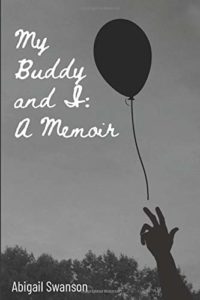An Interview with Abigail Swanson
 Interviews are some of my favorite posts to put together, mainly because I’m excited about the authors I choose to interview. Today’s interviewee is a real pleasure to feature: Abigail Swanson is a current high school student and daughter of a college acquaintance. Abigail’s older brother, Jonathan, was born at thirty-one weeks with Cornelia de Lange syndrome (CdLS), a genetic disorder present from birth. Cornelia de Lange syndrome “causes such a broad range of potential physical, cognitive and medical challenges that it is now known as the CdLS spectrum disorder,” and it is seen in all races and ethnic backgrounds. In addition, all genders are equally affected. Last year, Abigail took up an admirable goal: to write a book “to spread awareness about the impact of living with a special needs sibling.” Her hope? To “help the general public to gain insight into what a person with a disabled sibling might be going through.” The result of that goal is My Buddy and I: A Memoir, which was published in 2019. Like other high school students, Abigail is one busy person, so I’m thrilled she found the time to answer a few questions. And since it sounds like most folks call her Abbie, we’re using that name here today.
Interviews are some of my favorite posts to put together, mainly because I’m excited about the authors I choose to interview. Today’s interviewee is a real pleasure to feature: Abigail Swanson is a current high school student and daughter of a college acquaintance. Abigail’s older brother, Jonathan, was born at thirty-one weeks with Cornelia de Lange syndrome (CdLS), a genetic disorder present from birth. Cornelia de Lange syndrome “causes such a broad range of potential physical, cognitive and medical challenges that it is now known as the CdLS spectrum disorder,” and it is seen in all races and ethnic backgrounds. In addition, all genders are equally affected. Last year, Abigail took up an admirable goal: to write a book “to spread awareness about the impact of living with a special needs sibling.” Her hope? To “help the general public to gain insight into what a person with a disabled sibling might be going through.” The result of that goal is My Buddy and I: A Memoir, which was published in 2019. Like other high school students, Abigail is one busy person, so I’m thrilled she found the time to answer a few questions. And since it sounds like most folks call her Abbie, we’re using that name here today.
Christina: For those readers who don’t know what Cornelia de Lange syndrome is, how would you describe it, in your own words?
Abbie: I would describe Cornelia de Lange Syndrome as a rare [1 in 10,000 live births] genetic disorder that affects one of a person’s chromosomes. The genetic mutation is either inherited or spontaneous. Given that it is a syndrome, it affects individuals in a multitude ways. Some are able to attend college and live independently whereas others require constant care for their daily needs. Almost all individuals have problems with eating and reflux, smaller limbs and stature, and excessive hair growth.
Christina: Many authors choose to fictionalize their stories. Why did you choose memoir? What do you hope to gain from selecting the genre?
Abbie: I wanted to expose my readers to the realities of living with a special needs sibling. I wanted to share everything at face value and not have the readers wonder what was true and what was fiction.
Christina: In the first chapter, “Love,” you write: “I often wonder where my responsibilities lie. At what point do I cross over from a sibling to a caregiver?” Sibling relationships are complicated even without the added responsibility of caregiver. What have you learned about the sibling relationship?
Abbie: I have learned that there is no set role for a sibling. However, there are certain consistencies that I have noticed. To start, I get just as frustrated with my brother as other siblings do. He enjoys pushing my buttons in hopes of getting a response. I also have days where my brother and I are not on the same page, and things do not necessarily go my way. His needs often have to come ahead of mine and have a nature of being unpredictable. I have noticed that other sibling relationships have a similar dynamic.
Christina: Did anything surprise you as you wrote this book? Anything come up that you didn’t anticipate?
Abbie: The book allowed me to question things in my life and why they were that way. For example, I had never really known the details behind why my brother had a feeding tube. I had always just assumed that he was incapable of eating through his mouth. However, through the process of writing my book, I learned that he was originally able to eat through his mouth, and it was not until he caught a cold and had to have additional medical treatment that he lost the ability to do so.
Christina: It’s important for those who take care of others to take care of themselves too. How do you do that?
Abbie: I am fortunate that my parents are very flexible and allow me to step away and relax whenever I need to do so. I do so by spending time with friends, participating in clubs, crocheting, and watching my favorite television shows.
Christina: What is it that you hope your brother understands?
Abbie: I hope my brother understands that he is well loved and that we are always here for him. Recently, he has been learning to come to us when he wants to hang out or needs attention. I am glad that he is beginning to recognize that by coming to us he is able to receive what he wants.
Christina: What was the best part about publishing this book? The worst? Should we expect more from you as an author?
Abbie: I am glad to be spreading the word about relationships of individuals with special needs siblings. I hope that by writing the book, I was able to introduce others to the concept. It was really hard to try and maintain an honest voice. I had to make sure that I was not exaggerating due to my emotions as well as making sure I was not minimizing the impact of things because of my familiarity with them. I do not currently have any plans to write another book, but maybe once I am older and have more experiences to share, I will either add on to the book or create a sequel.
Thanks to Abigail for agreeing to this interview! If you know of an author who’d like to be featured in an interview (or you are an author who would like to be featured), feel free to leave a comment or email me via my contact page.

